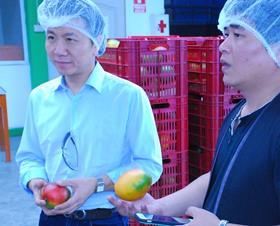
Peruvian mango exports to South Korea are set to get underway this season, after Korean authorities approved a phytosanitary protocol for the fruit today.
Peru’s Agriculture Minister Juan Manuel Benites confirmed the breakthrough had been achieved after three years of technical efforts from the country’s National Service of Agrarian Health (Senasa) and the Quarantine Agency of Animal and Plant Health (QIA).
Korea becomes the third Asian country to open its doors to Peruvian mangoes, according to the Ministry of Agriculture and Irrigation, joining Japan and China.
President of the Peruvian Association of Agrarian Producers Guilds (AGAP) Enrique Camet welcomed the opening of the Korean market, saying it would help to drive an increase in mango exports.
“We are ready to start exports. We have experience with hot water treatment and we can comply with all the phytosanitary requirements that Senasa and the technical agencies of importing countries demand,” said Camet.
Peruvian Mango Grower Association (APEAM) head Joaquín Balarezo said South Korea would be “a valuable market for the growth of Peruvian production” and commended the work done by Senasa and Minagri to open up new markets.
Balarezo estimated that around 600-700 tonnes of mangoes would be exported to South Korea in the upcoming season, pointing out that the country imports more than 70 per cent of its food and agricultural needs at a value of US$21bn.
Peru is now shipping mangoes to a wide range of markets including Europe, the US, Japan, New Zealand, Chile and Mexico as well as other major world economies, Balarezo added.
Benites said the diversity of destinations encourages increased production and generates employment for Peruvians.
At the current growth rate, Benites predicted that Peru’s total agriculture exports would surpass US$6bn next year, driven by coffee, quinoa, asparagus, avocados, mangoes, grapes and other crops.
Peru has a free trade agreement with South Korea, which took effect in March 2012. Under the pact, import duties on are due to be phased out over a ten-year period.
Minagri said that Senasa and QIA are now negotiating access to the Korean market for Peruvian blueberries and they have also requested a pest risk analysis to be undertaken for avocados and citrus.
Korea consuming more mangoes
Korea’s mango imports have enjoyed significant growth over the past few years, rising from under 2,000 tonnes in 2011 to over 10,000 tonnes in 2014, according to Korean customs data. The Philippines and Thailand dominate supply, shipping around 4,955 tonnes and 4,613 tonnes respectively in 2014, but Taiwan has also seen consistent growth and last year shipped close to 1,000 tonnes.
Speaking at Asiafruit’s Fruitnet Peru-Asia Export Forum in Lima earlier this month, Chang-Hwa Oh, president of leading Korean importer Jinwon Trading said mangoes were becoming more popular among Korean consumers.
Oh explained that mangoes were largely consumed by the food service sector, with Thailand’s high-brix fruit mainly shipped by air and Philippine mangoes predominantly used as toppings on desserts. While supply from these South East Asian suppliers is dominated by yellow-skin varieties, he noted that Taiwan’s red-skin mangoes, often referred to as 'apple mangoes', were enjoying consistent demand during June/July– a positive sign for Peru.
“If we can get red mangoes with good arrival condition during the winter months, I expect our market can take a few thousand tonnes of Peruvian mangoes,” he commented.
As part of the programme of activities at the Peru-Asia Export Forum, Oh took part in a field visit to key mango packer-exporters in Piura to forge relations ahead of the market opening.
Responding to news of the market opening today, Oh said it was difficult to gauge whether hot water treatment would affect arrival condition because his company had limited experience of shipping fruit under such protocols. 'Also, we are not sure which varieties will be good after the long voyage from Peru to Korea,' he said.
Oh added that the next step was for Peruvian exporters to invite Korea's plant quarantine service (KNPQS) to the country to inspect shipments. 'After receiving an invitation, KPNS will send an officer within a month,' he noted.






No comments yet